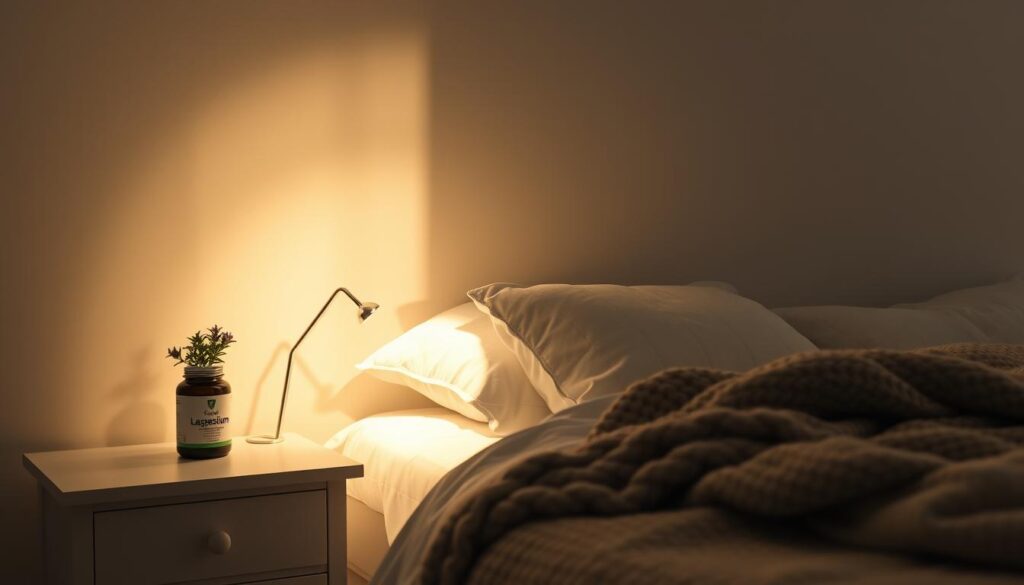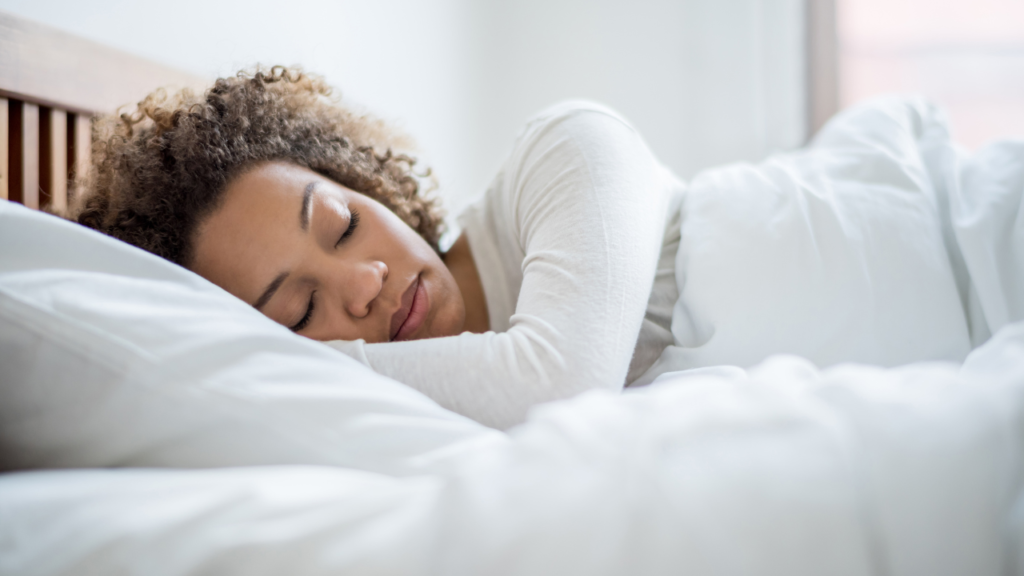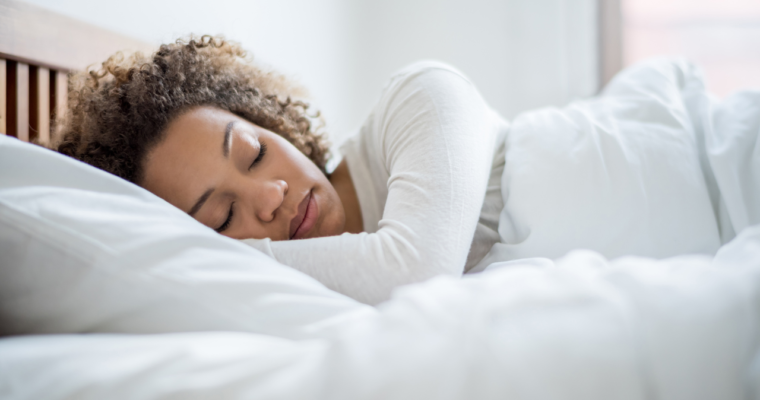Welcome to your guide on how sleep affects your overall wellness. We’ll show you how good sleep can boost your immune system and improve your health. You’ll learn tips to get better sleep and see how it changes your life.

Key Takeaways
- Understand the importance of adequate sleep for physical and mental well-being.
- Discover the consequences of sleep deprivation and how it can impact your health.
- Learn how to optimize your sleep environment and establish a relaxing bedtime routine.
- Explore the connection between nutrition, exercise, and better sleep.
- Uncover the relationship between sleep and the immune system.
Importance of Adequate Sleep
Getting enough sleep is key for staying healthy in body and mind. A good night’s rest helps our immune system and brain work better. It’s vital for our overall health and happiness.
Physical and Mental Benefits
While we sleep, our bodies fix and heal. This helps our immune system, heart, and muscles. It also makes our brains work better, helping us focus, learn, and remember things.
Consequences of Sleep Deprivation
Not sleeping enough can harm us a lot. It weakens our immune system and makes us more likely to get sick. It also makes it hard to think clearly, which can lead to mistakes and accidents. Long-term lack of sleep can cause serious health problems like obesity, diabetes, and heart disease.
“Sleep is the golden chain that ties health and our bodies together.” – Thomas Dekker
It’s important to value sleep and get enough rest. Knowing how sleep helps us and what happens if we don’t get enough can help us sleep better. This can make our lives better and healthier.
Understanding Your Sleep Cycle
Learning about the sleep cycle is crucial for getting good rest and feeling refreshed. The sleep cycle has different stages that work together, controlled by our natural body clock. Knowing these stages and how they work can help us sleep better and feel better overall.
Stages of the Sleep Cycle
The sleep cycle has four main stages:
- Stage 1 (Light Sleep): This stage is when you first start to fall asleep. Your body starts to relax and slow down.
- Stage 2 (Light Sleep): Your brain activity slows down, and your body temperature drops. You’re getting ready for deeper sleep.
- Stage 3 (Deep Sleep): This is the most restful stage. Your brain waves slow down, and your muscles relax. Your body temperature is at its lowest.
- REM (Rapid Eye Movement) Sleep: In this stage, your brain is active, and your eyes move quickly. But your body is paralyzed to prevent acting out dreams.
These stages keep repeating all night, each cycle lasting about 90 minutes.
The Role of Circadian Rhythm
Our circadian rhythm is like an internal clock that controls our sleep and other body functions. It’s affected by things like sunlight and temperature. It helps us stay on a regular sleep schedule. If it gets disrupted, it can cause sleep problems and other health issues.
| Sleep Stage | Duration | Characteristics |
|---|---|---|
| Stage 1 | 5-10 minutes | Light sleep, body and brain begin to slow down |
| Stage 2 | 10-25 minutes | Deeper sleep, body temperature drops, eye movements stop |
| Stage 3 | 20-40 minutes | Deepest and most restorative sleep, slowest brain waves |
| REM | 10-60 minutes | Brain becomes more active, rapid eye movements, body remains still |
By understanding the sleep cycle and the circadian rhythm, we can improve our sleep habits. This can lead to better health and well-being.
Establishing a Sleep-Friendly Environment
Creating a cozy and calming sleep space is key for good sleep. By making your bedroom comfy and setting a soothing bedtime routine, you’re ready for a good night’s rest. Let’s look at how to make your sleep space the best it can be.
Optimizing Bedroom Setup
Your bedroom should be a peaceful place for sleep. Start with a mattress and pillows that support you well. Choose bedding that lets air flow and keeps you at a comfy temperature. Keep it cool, dark, and quiet by managing the lights, temperature, and noise.
- Invest in blackout curtains or blinds to eliminate any external light sources.
- Use a white noise machine or earplugs to minimize disruptive sounds.
- Keep the bedroom temperature between 65 and 70 degrees Fahrenheit for optimal sleep.
Creating a Relaxing Routine
Having a regular bedtime routine tells your body it’s time to relax and get ready for sleep. Do calming things to help you unwind and get into a sleepy state. Here are some activities to add to your bedtime routine:
- Practice light stretching or gentle yoga poses to ease muscle tension.
- Read a book or listen to soothing music to distract your mind from the day’s stresses.
- Take a warm bath or shower to help lower your body temperature.
- Engage in deep breathing exercises or mindfulness meditation to quiet your mind.
By making your sleep space comfy and having a calming bedtime routine, you’re setting up for better sleep and better health. Focus on these tips to improve your sleep and wake up feeling refreshed.
Nutrition and Exercise for Better Sleep
Getting good sleep is more than just having a comfy bed. What you eat and how active you are also matter a lot. Let’s look at how eating right and staying active can help you sleep better.
Dietary Recommendations for Better Sleep
Some foods and nutrients can make you sleep better. Add these sleep-promoting foods to your meals:
- Tryptophan-rich foods like turkey, eggs, nuts, and seeds, which help produce serotonin and melatonin, hormones that regulate sleep.
- Magnesium-rich foods such as leafy greens, whole grains, and dark chocolate, as magnesium has been linked to improved sleep quality.
- Foods high in vitamin B6, like bananas, poultry, and wild-caught fish, which support the production of melatonin.
- Cherries and tart cherry juice, which are natural sources of melatonin.
Drinking plenty of water and avoiding caffeine, alcohol, and heavy foods before bed can also help. This balance of sleep and nutrition is key.
Exercise and Sleep: A Symbiotic Relationship
Being active is good for your health and helps with sleep. Moderate exercise during the day makes it easier to fall asleep and sleep well. Try to do at least 30 minutes of activity, like walking, cycling, or lifting weights, for better sleep.
But, don’t work out too hard before bed. It can keep you awake. Instead, do relaxing activities like yoga, stretching, or a short walk in the evening to help you sleep.
Sleep and Immune System
Sleep and the immune system are closely linked for good health. Studies show that getting enough sleep boosts our immune system. It helps fight infections and reduces inflammation.
Sleep helps by making more cytokines. These proteins fight inflammation and infections. Without enough sleep, we make fewer cytokines. This makes us more likely to get sick.
| Sleep and Immune System Benefits | Impact on Immune Function |
|---|---|
| Increased cytokine production | Strengthens the body’s ability to fight off infections and illnesses |
| Reduced inflammation | Lowers the risk of chronic health issues associated with inflammation |
| Improved lymphocyte function | Enhances the immune system’s ability to detect and eliminate pathogens |
Sleep also helps the lymphatic system. This system removes waste and toxins. When we sleep, it works better, keeping us healthy.
Getting enough sleep every night makes our immune system stronger. It keeps us feeling good.
“Sleep is the golden chain that ties health and our bodies together.” – Thomas Dekker
Managing Sleep Disorders
For people dealing with sleep problems, it’s key to understand and manage sleep disorders. This is vital for better health and happiness. There are many ways to help those struggling with sleep, from simple insomnia to complex sleep apnea.
Common Sleep Disorders
Insomnia and sleep apnea are two big sleep disorders. Insomnia makes it hard to fall asleep, stay asleep, or wake up too early. Sleep apnea happens when the airway blocks during sleep, causing breaks in breathing.
- Insomnia: Trouble falling asleep, staying asleep, or waking up too early
- Sleep Apnea: Blocked airway during sleep leads to broken breathing
- Restless Leg Syndrome: Unpleasant feelings in the legs that make you want to move them
- Narcolepsy: Too much daytime sleepiness and sudden sleep attacks
Treatment Options
There are many ways to help with sleep disorders. These include:
- Lifestyle changes: Keep a regular sleep schedule, make your bedroom sleep-friendly, and try relaxing activities
- Cognitive-behavioral therapy (CBT): Work on thoughts and behaviors that affect sleep
- Medicine: Doctors might suggest sleep aids, either by prescription or over-the-counter
- Medical devices: For sleep apnea, a CPAP machine might be prescribed
Working with healthcare experts can help find the best treatment for sleep disorders. This can lead to better sleep disorder treatment.

“Quality sleep is key for our health. Fixing sleep problems can greatly improve our well-being.”
Sleep Hygiene Tips
Getting good sleep is key for your health and happiness. By following sleep hygiene tips, you can better your sleep habits. This section offers practical sleep tips. These tips will help you make your bedroom sleep-friendly and set up a calming bedtime routine.
- Stick to the same sleep schedule every day, even on weekends. This helps your body clock stay in sync.
- Stay away from blue light before bed. This means no phones, tablets, or computers to avoid disrupting your sleep cycle.
- Have a calming bedtime routine. Activities like reading, stretching, or meditation help signal to your body that it’s time to sleep.
- Make sure your bedroom is cool, dark, and quiet. This creates a perfect sleep environment.
- Don’t have caffeine, nicotine, or alcohol close to bedtime. These can make it hard to fall asleep and get quality rest.
Adding these sleep hygiene tips to your daily life can improve your sleep habits. A consistent and thoughtful approach to sleep greatly benefits your health and happiness.
Stress Management Techniques
Stress can really hurt your sleep and overall health. To fight stress, try different stress management techniques like mindfulness and relaxation exercises. These can help you relax, lower anxiety, and get better sleep.
Mindfulness and Relaxation Practices
Adding mindfulness and relaxation to your daily life can help manage stress and sleep better. Here are some good strategies to try:
- Meditation: Regular meditation can calm your mind, cut down stress, and help you sleep better. Try guided meditations or mindfulness exercises to relax and leave the day’s worries behind.
- Deep Breathing: Spend a few minutes focusing on your breathing with techniques like diaphragmatic breathing or the 4-7-8 method. This can reduce tension and make you feel more relaxed.
- Yoga: Gentle yoga poses and sequences can release stress, both physical and mental. This can lead to better sleep and overall health.
- Progressive Muscle Relaxation: This method involves tensing and then relaxing different muscle groups. It helps reduce physical tension and leads to deep relaxation.
Using stress management, relaxation techniques, and focusing on sleep and stress can greatly improve your sleep and health. Try different methods to see what works best for you.
“Regular practice of relaxation techniques can have a profound impact on both your sleep and your ability to manage stress effectively.”
Sleep Tracking and Monitoring
In today’s digital age, technology has changed the way we track sleep. Now, we have tools like wearable devices and mobile apps to help us understand our sleep better. These tools give us important insights into our sleep habits and help us find ways to improve them.
Wearable devices like Fitbit, Garmin, and Apple Watch are very popular. They track sleep stages, quality, and how long we sleep. They work with our phones to give us real-time data and advice to better our sleep.
Mobile apps like Sleep Cycle, Calm, and Sleeprate offer many features. They help us monitor sleep cycles, relax with sounds, and guide us through meditations. These apps make it easy to take care of our sleep from our phones.
Some people choose more advanced sleep systems, like smart mattresses or bedside sensors. These systems use the latest technology to track our sleep patterns, breathing, and movements. This detailed info is great for those who need to manage sleep disorders or work with doctors.
FAQ
What are the physical and mental benefits of adequate sleep?
Adequate sleep keeps your body and mind in top shape. It boosts your immune system, sharpens your thinking, and lifts your mood.
What are the consequences of sleep deprivation?
Not getting enough sleep weakens your immune system and lowers your productivity. It also raises the risk of serious health issues like heart disease, diabetes, and obesity.
How does the sleep cycle work, and why is it important to understand it?
The sleep cycle has stages like REM and non-REM sleep. Knowing about these stages and your body’s natural rhythm helps you sleep better and stay on a regular sleep schedule.
How can I create a sleep-friendly environment?
Make your bedroom comfy by controlling the light, temperature, and noise. Also, having a calming bedtime routine can help you sleep better.
What dietary and exercise recommendations can help with better sleep?
Eat foods that help you sleep and stay active. These habits can make your sleep patterns healthier and improve your overall well-being.
How does sleep influence the immune system?
Good sleep boosts your immune system. It lowers inflammation and helps your body fight off sickness.
What are some common sleep disorders, and how can they be treated?
Insomnia and sleep apnea are common sleep issues. You can treat them with lifestyle changes, therapy, or medical help.
What are some effective sleep hygiene tips?
Stick to a regular sleep schedule and avoid blue light before bed. A calming bedtime routine also helps.
How can stress management techniques improve sleep quality?
Using mindfulness and relaxation techniques can ease anxiety and lead to better sleep.
How can sleep tracking and monitoring technology help improve my sleep?
Sleep tracking tools give you insights into your sleep habits. They can show you how to sleep better.
Stay Connected and Enhance Your Well-Bing
- Free Training: Realign Your Wellness
- Join Our Wellness Community: Wellbeing Group on Facebook
- Take Your Wellness Assessment: Health & Sleep Checklist
- Explore More Free Resources: Wellness Resources
- Contact Us: info@clarissabooker.com
- Watch on YouTube: Holistic Wellbeing Vibes
Stay connected with us for tools, resources, and support on your holistic wellness journey!

